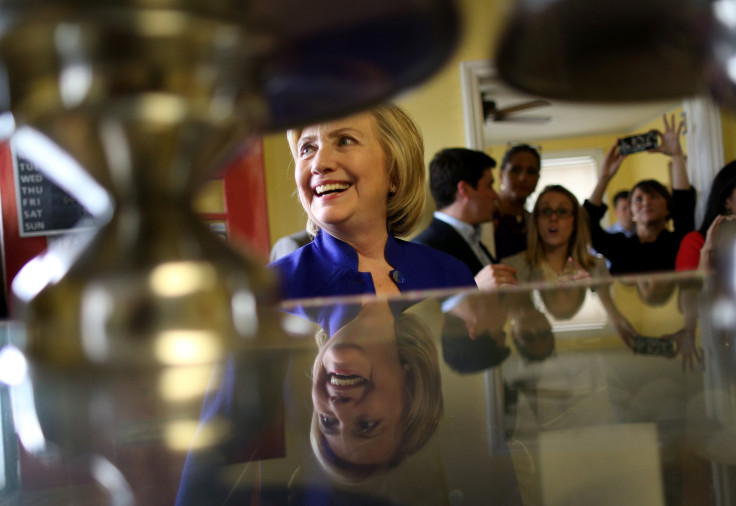Five Things We Learned From Hillary Clinton’s Roosevelt Island Rally In New York

Welcome to the campaign. Looking to introduce voters to Hillary Rodham Clinton -- rather than U.S. Sen. Clinton, Secretary of State Clinton or even first lady Clinton -- the leading contender for the Democratic Party’s presidential nomination in 2016 rallied supporters on New York’s Roosevelt Island with a speech that dove into her personal life. It’s a speech and rally that her campaign said would set the tone for the rest of her candidacy.
Clinton recently became a grandmother, and it was her mother, Dorothy Rodham, who embodied a major theme of the event. Clinton closed the rally with the story of her mother’s life and spoke in detail about the role her family played in making her an advocate for others.
Below are five things voters learned -- or relearned -- about the candidate during the rally.
1. Early in her career, Clinton worked for the Children’s Defense Fund. It was her first job out of law school, she said, and working with kids was a major part of her early work and of her Saturday speech. Clinton said she walked “door to door to find out how many children with disabilities couldn’t go to school.”
Her first scholarly article was titled “Children Under the Law,” published in the Harvard Educational Review in 1973. In it, she discussed the legal status of “child citizens” who were “powerless individuals.” She also referred to several other groups of people -- including wives, slaves and Native Americans -- that she said have long been unable to speak for themselves.
2. Clinton’s mother, who died at age 92 in 2011, had an abusive and traumatic childhood. She was given up by her father at age 8 and sent across the country alone on a train with her 3-year-old sister. Both were to live with her strict grandparents in California: They once confined young Rodham to her room for a year as a punishment for trick-or-treating. Clinton talked about how her mother impacted her personally and professionally.
“I believe that success isn’t measured by how much success the wealthiest Americans have, but by how many children climb out of poverty, how many young people go to college without drowning in debt, how many people find a good job, how many families get ahead and stay ahead,” Clinton said. “I didn’t learn this from politics. I learned this from my own family. My mother taught me that everyone needs a chance and a champion. She didn’t have either one.”
In her memoir, “Living History,” Clinton wrote about her mother’s tragic childhood, saying, “I thought often of my own mother’s neglect and mistreatment at the hands of her parents and grandparents, and how other caring adults filled the emotional void to help her.”
3. As president, Clinton indicated, her major focus would be on college affordability, early-childhood education, national security and wages. “Too many of our kids never have the chance to learn and thrive as we need them to,” she said, highlighting the role teachers play in education. Clinton said that if she were elected, she would propose that the U.S. “make preschool and quality child care available to every child in America.”
According to Jennifer Palmieri, the Clinton campaign’s communications director, the candidate will look to frame the race as a choice between her ideas and those of Republicans’ top-down economic policies, which encompass lower taxes for the rich and fewer regulations for corporations. “The question of the campaign is: Who is the candidate in the race who understands what my life is like, what the problems are, has solutions and is going to hang in and fight for me everyday and get things done?” Palmieri told Politico. “There’s not any candidate that’s better qualified than her to be that fighter for people.”
4. Clinton is “starting from scratch.” In addition to generating momentum, the event on Roosevelt Island in the middle of the East River was designed to relaunch Hillary Clinton. She was not shy about her message focusing on middle-class workers and income inequality. She pointed to farmers, nurses, truckers and other workers specifically when talking about her plan for the presidency.
“Prosperity can’t be just for CEOs and hedge-fund managers; democracy can’t be just for corporations,” she said. “Prosperity and democracy are part of your basic bargain, too. America can’t succeed unless you succeed. That is why I am running for president of the United States.”
Clinton also said she would propose a constitutional amendment undoing the U.S. Supreme Court’s decision in the so-called Citizens United case, which allows unlimited contributions to political campaigns from corporations. The court ruled businesses were no different from people and that money was ostensibly free speech.
5. Bill Clinton appears unlikely to be a major player in the campaign. There has been speculation about the role of Hillary Clinton’s husband since her April 12 announcement that she was running for president. During her Roosevelt Island rally, Bill Clinton was present and accounted for, but appeared onstage at his wife’s side only at the conclusion of her speech. Hillary Clinton lauded the former president early in her remarks, but he remained behind the scenes. This looks to be an ongoing theme of her campaign. He has not been visible on the campaign trail, and told an interviewer recently that “my role should primarily be as a backstage adviser.”
Clinton also made a number of humorous, seemingly off-the-cuff remarks throughout her speech. When discussing her age and her status as potentially the first woman president, Clinton joked: “You won’t see my hair turn white in the White House. I’ve been coloring it for years.”
© Copyright IBTimes 2024. All rights reserved.






















